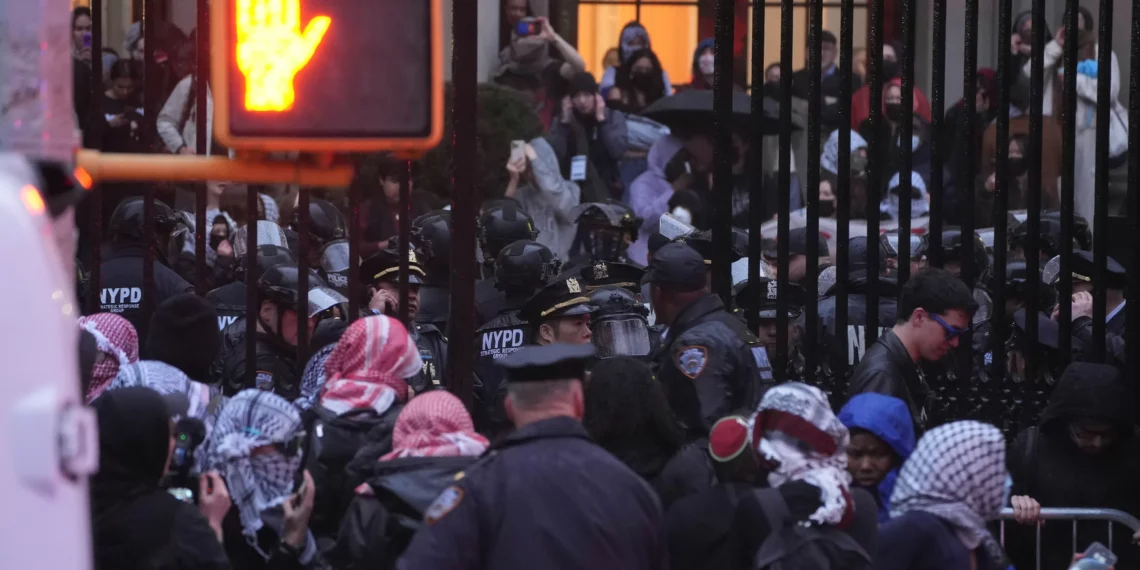A bomb threat at Barnard College has once again brought to light the ongoing tensions and discrimination faced by student protesters. This time, the threat specifically targeted the “terrorists/communists that are protesting”, but the school’s response has left many questioning why the blame was placed on the protesters instead of the perpetrator.
On the morning of Thursday, October 24th, a bomb threat was made against Barnard College, a prestigious women’s college located in New York City. The threat targeted the student protesters who have been occupying the campus for the past few weeks, demanding better support and resources for marginalized students. The threat was taken seriously by the school, leading to the evacuation of several buildings and the cancellation of classes for the day.
However, what was most alarming about this threat was not just the fact that it was made, but the way in which the school chose to address it. In their initial statement, Barnard College failed to mention the specific targeting of the protesters and instead focused on the general threat to the campus. This omission speaks volumes about the way in which the school views and values its student protesters.
It is no secret that student protesters are often met with hostility and backlash, especially when their actions challenge the status quo. They are often labeled as “troublemakers” or “disruptive”, and their demands are dismissed as unrealistic or unnecessary. This is a narrative that has been perpetuated for decades, and unfortunately, it seems to have seeped into the response of institutions like Barnard College.
The fact that the school’s initial statement did not acknowledge the specific targeting of the protesters is not only concerning, but it also sends a dangerous message. It implies that the school does not take the concerns and safety of its student activists seriously and that it is more concerned with maintaining a certain image than addressing the root cause of the issue.
This is not the first time that student protesters at Barnard College have faced discrimination and backlash. In 2018, a group of students occupied the president’s office to demand divestment from fossil fuels and the end of the school’s ties with the NYPD. The response from the school was once again dismissive and hostile, with the protesters being labeled as “irresponsible” and “destructive”. This pattern of response from the school is deeply concerning and needs to be addressed.
It is important to recognize that student protesters are not just causing inconvenience or disruption, they are fighting for important causes that affect not only themselves but also the wider community. They are standing up against injustices and demanding change, and they should be commended for their bravery and determination, not vilified and blamed for threats made against them.
The fact that the school’s response to the bomb threat failed to acknowledge the specific targeting of the protesters is also a reflection of the larger societal issues at play. In today’s political climate, activism and protest are often seen as controversial and divisive, and those who engage in it are often labeled as “anti-American” or “radicals”. This rhetoric only serves to further marginalize and silence those who are fighting for a better world.
It is time for institutions like Barnard College to take a stand and support their student activists. This means not only acknowledging and addressing threats made against them but also actively working towards creating a safe and inclusive campus for all students. It means listening to their demands, taking them seriously, and working towards tangible solutions.
In the face of adversity, the student protesters at Barnard College have shown immense resilience and courage. They have continued to fight for what they believe in, despite facing discrimination and backlash. It is time for the school to stand with them and support them, instead of blaming them for threats made against them.
As students, we have the power to create change and challenge the systems that oppress us. We must continue to stand in solidarity with our fellow student activists and demand that our voices be heard. And as institutions, it is your responsibility to listen and support us, not turn a blind eye to the injustices we face.
In conclusion, the bomb threat at Barnard College is a stark reminder of the ongoing discrimination and hostility faced by student protesters. It is time for the school to take a hard look at its response and make a commitment to supporting and protecting its student activists. We must create a campus where all students feel safe and valued, and where their voices are heard and respected. Let us not forget the words of Martin Luther King Jr., “







